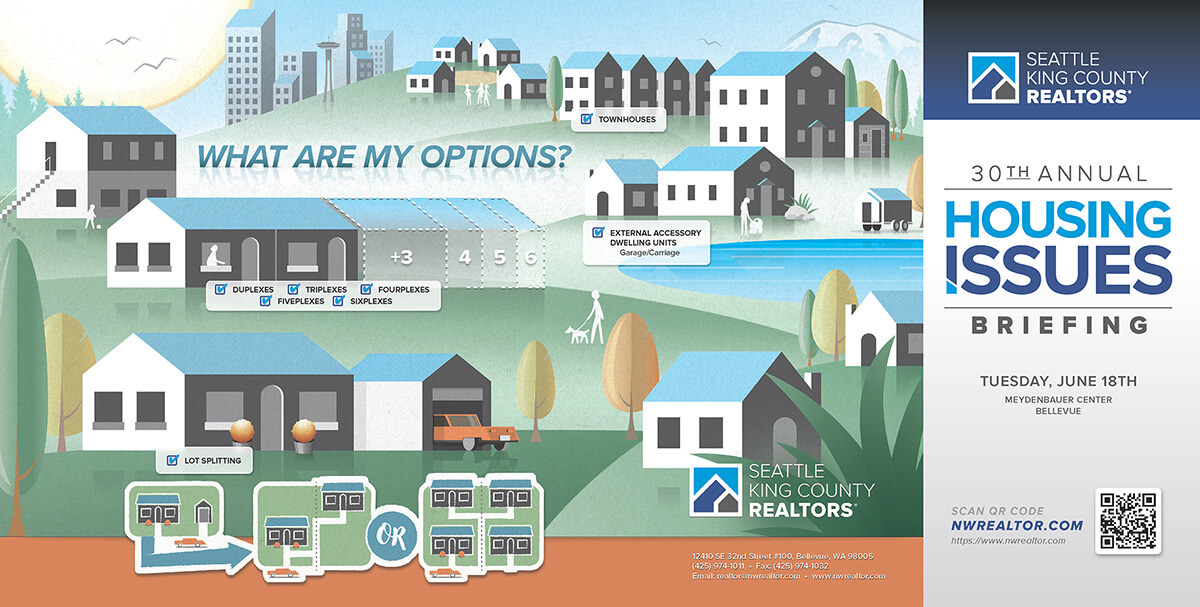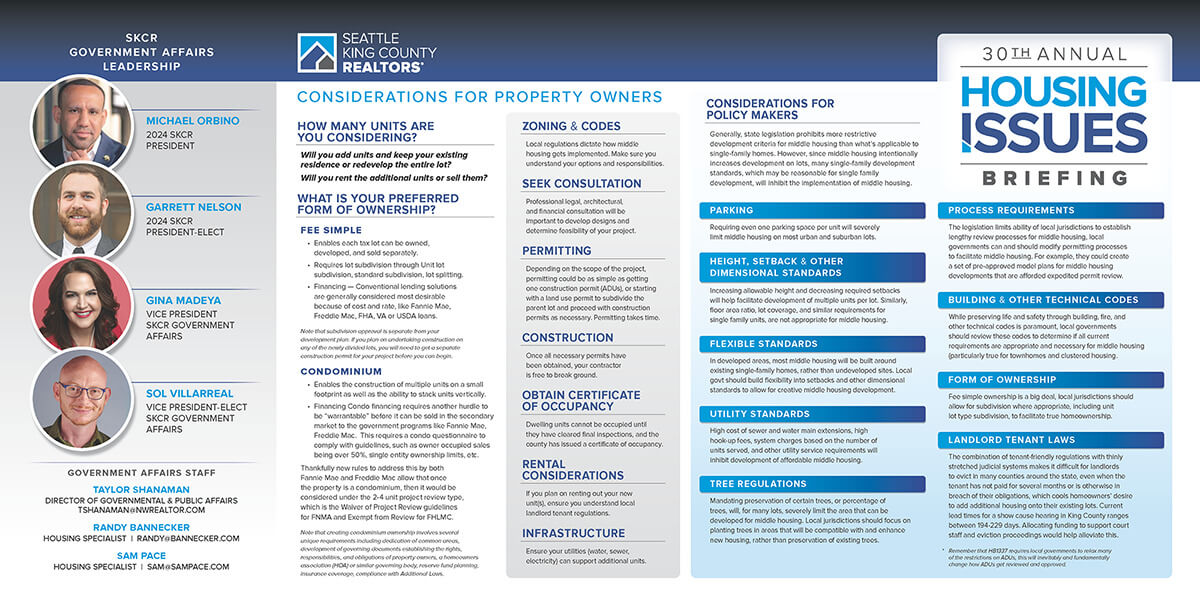Elected officials, candidates join REALTORS at 30th Annual Housing Issues Briefing
July 8, 2024
“We need to take bold action to alleviate housing supply issues, ultimately helping affordability,” said Gina Madeya, 2024 vice president of governmental and public affairs for Seattle King County Realtors® (SKCR) in opening remarks at the association’s 30th Annual Housing Issues Briefing.
Speaking before an audience of legislative candidates, local elected officials, planners, policymakers, and others, Madeya said, “We need to continue raising awareness of crucial housing shortages and the need to bring Missing Middle Housing to fruition. Now we need to know what it will take to create desirable middle housing for current and future residents while also improving neighborhood quality.” She noted our region has had less than two months of supply for the past decade, well short of the 4-to-6 months indicator of a balanced market.
To address the issues, SKCR assembled a panel representing development, lending, and legal interests, and provided a handout outlining considerations for property owners and policy makers, process requirements, building and other technical codes, forms of ownership, and landlord tenant laws.
Panelists included:
- Roque Deherrera, manager of real estate and development at Legacy Group Capital
- Vincent Ha, senior loan consultant at Axia Home Loans
- Michael Spence, real estate attorney at Helsell Fetterman LLP
- Michael Orbino, SKCR’s 2024 president and co-founder/managing broker at Team Foster Compass Builder + Development Service, served as moderator for the panel discussion and audience Q&A.
In opening the discussion, Orbino said the “brainpower and hearts in this room are what make good public policy. As Realtors, our goal is finding where we can meet in the middle to move progress forward.” Turning to the panelists, he asked what middle housing means.
“For someone with children, having the opportunity to help them realize the American Dream of homeownership is important,” said Ha. As the child of a pastor who didn’t earn much, he said his dad found a home with a second unit that enabled him to pay bills and build some equity, which proved to be a valuable lesson.
“Creating condos was once a lower rung on the housing ladder,” Ha observed. However, he stated, the state’s Condominium Act had the unintended consequence of squelching condo development across much of the state.
Now, ADUs (Accessory Dwelling Units) and DADUs (Detached Accessory Dwelling Units) provide an entry point and make it easier to pencil while increasing inventory, Ha suggested.
Deherrera, who also owns Roq Homes, an infill housing developer, spoke of his experience developing and building his own home, believed to be the first single-family DADU in Seattle. With Seattle’s limit of 1,000 square feet for a DADU, there’s not much flexibility, Deherrera remarked, adding, "it’s not practical for families with kids."
Attorney Spence agreed the rules around ADUs and DADUs are “pretty rigid.” He commended elected officials and candidates who are willing to take on the challenges, while encouraging jurisdictions to become more flexible on requirements for these “tiny homes.”
Spence also called for advancing HB 1110 (known as the 2023 Middle Housing Bill) and HB 1337 (to ease barriers to creating and using ADUs).
HB 1110 is intended to address the state’s acute housing shortage by changing the way many cities plan for housing. It requires cities of certain sizes and locations to allow multiple dwelling units per lot in a “middle housing” type of form, including two or more attached, stacked, or clustered homes.
HB 1337, also passed in 2023, expands housing options by requiring cities in Washington to update their ADU codes to allow two ADUs, drop owner occupancy, eliminate off-street parking requirements, allow condoization, and reduce impact fees by 50% for ADUs.
Asked if any of King County’s 39 jurisdictions are “role models” in implementing these bills, Spence said it’s too soon to know.
Panelists were also asked to comment on rising insurance premiums, the cost of financing, and forms of ownership.
Spence, whose law firm represents several infill developers, said identifying the best form of ownership can sometimes be a challenge. Creating condos may be the easiest way in some cities. He pointed to the Washington Uniform Common Interest Ownership Act (WUCIOA) that governs new condos and other planned communities (“common interest communities”). For some, the requirements are “massively oppressive,” according to Spence.
Deherrera noted nuances in land use codes can sometimes become hurdles, as well as some things that are beyond cities’ controls, such as drainage. “Cities need help up the line,” he commented.
Ha, who serves as National Affordable Housing Chair for AREAA (Asian Real Estate Association of America) referred to its recently published Housing Affordability White Paper that includes a section on making housing affordable and equitable. It includes research on disparities in homeownership rates by race, stating, “Real estate professionals, policymakers, and the American public at large have a vested interest in expanding homeownership opportunities to the underserved.”
Panelists also discussed unintended consequences of well-meaning policies, mentioning tree canopies, parking requirements, and design reviews.
Following a segment for Q&A with the audience, Orbino invited the panelists to offer a closing thought.
Spence referred to the 13 goals of the Growth Management Acts, recommending “balance” as a way to achieve more affordability without compromising community.
Ha advocates for the acronym SAI (Supply, Accessibility, and Inclusion), saying that including those that are most in need doesn’t mean you’ll add crime to your neighborhood.
Deherrera commented on the fear of change. “Kindness goes a long way. Listen to neighbors.” He also offered advice to elected officials, emphasizing we’re running out of builders (they’re aging out) so supporting the trades is important.
This year’s Housing Issues Briefing, held in Bellevue, was supported in part by a grant from the National Association of Realtors® and its Housing Opportunity Program, and by Washington Realtors®.
Taylor Shanaman, director of governmental and public affairs at SKCR, said the annual housing briefings are designed to encourage an open dialogue with elected officials and candidates in hopes of alleviating supply issues and creating equitable opportunities for homeownership, particularly among communities of color. “Identifying and understanding housing solutions, such as with infill housing, are not just about opportunities, it’s also about finding ways to close significant gaps in homeownership rates.”


